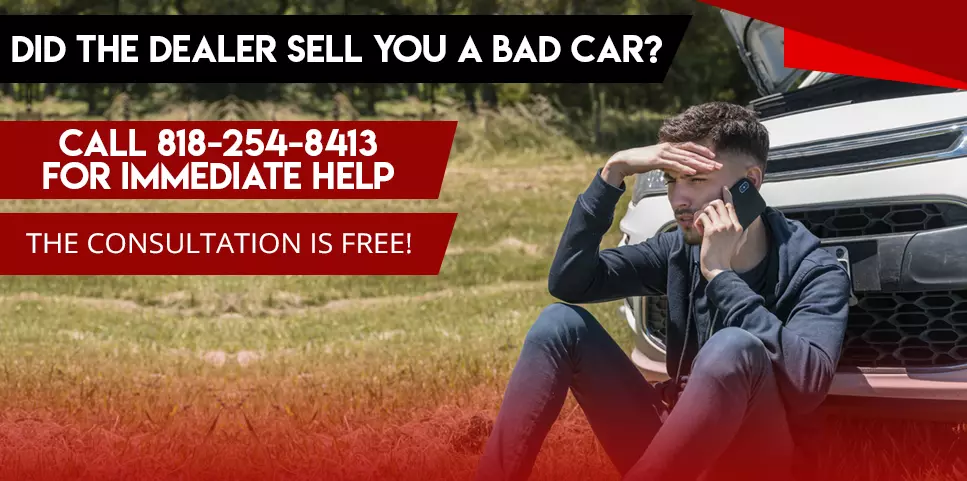
Buying a used vehicle represents a significant financial decision where you expect reliable transportation and good value. However, even after researching and inspecting the car, you may later discover issues that make you regret the purchase. If that happens, you may ask yourself – can I return this used car to the dealership?
The answer depends on your specific situation and California’s consumer protection laws. While dealers generally don’t have to take back a vehicle just because you changed your mind, there are some circumstances that give you the option to return it. As a California auto fraud law firm, we understand the frustration and potential financial burden when dealers engage in misconduct.
This article discusses your rights and options for returning a used car in California when facing problems like undisclosed mechanical defects, odometer fraud, or misleading statements from the dealer. We’ll cover the laws that may enable you to cancel the purchase agreement, as well as best practices for documenting the issues and building a strong case. Having this knowledge will help you to decide if returning the car is the right path or if pursuing compensation is more viable.
Grounds for Returning a Used Car in California
As a car buyer in California, you have important consumer protections that may allow you to return a recently purchased used vehicle under certain circumstances. California’s “lemon laws” require dealers to address defective vehicles or honor service contracts, though specific eligibility requirements apply based on factors like the car’s age, mileage, and the type of defect.
Additionally, you may have grounds to return the vehicle if the dealer engaged in fraudulent practices or failed to uphold promises made verbally or in writing during the sale. Some common situations that could justify returning a used car in California include:
- You were charged a higher price than advertised or negotiated with the dealer.
- The car experienced a mechanical breakdown or required significant repairs soon after purchase, despite no disclosed issues.
- You discovered the car had undisclosed prior damage or repair issues, such as flood damage or major frame repairs.
- The dealer is refusing to address repair issues that should be covered under the stated warranty terms.
In these types of cases, California consumer laws aimed at preventing auto fraud may give you a remedy to cancel the purchase contract and return the vehicle. Documenting the issues and the dealer’s actions carefully is crucial for building a strong case.
Steps to Take When Facing Issues with a Used Car Purchase
If you suspect your recently purchased used vehicle may be defective or was misrepresented during the sale, it’s crucial to act promptly rather than ignoring the problems. Experts recommend taking the following steps:
- Review all documentation and recordings from the purchase process, looking for any discrepancies between verbal promises made by the dealer and the actual terms stated in the contract.
- Thoroughly inspect the vehicle, identifying and documenting any defects, damage, or needed repairs with clear photos and videos. This evidence will be essential for your case.
- If you believe the payments or pricing was unfairly inflated, research the market value using online pricing guides as comparisons to demonstrate proof of overcharging.
- Present your concerns and findings to the dealership’s management team in writing. Outline the facts objectively and focus on seeking a resolution, rather than simply venting frustrations.
- If the dealer fails to respond or address your issues within a reasonable timeframe, escalate by filing an official complaint with California’s consumer protection agency. They can investigate and potentially take action.
Gathering detailed documentation and following the proper channels is crucial for protecting your rights as a consumer and building a strong case against problematic dealer practices regarding your used car purchase.
Example Demand Letter for Defective Used Car Purchase
When writing to a dealership about possible defects or misrepresentations with a recently purchased used vehicle, the following is a sample demand letter format you can follow:
Dear [Dealership Manager],
This letter regards the issues I have encountered with the used [Make and Model] purchased from your dealership on [Date of Purchase]. As a loyal customer for many years, I’m disappointed that this vehicle does not meet the expected standards.
Specifically, I have discovered the following mechanical and cosmetic defects:
- Engine knocking noise indicating premature wear or improper maintenance
- Significant oil leak originating from the valve cover gasket
- Multiple dents and scratches on three of the door panels
- Cigarette burns in the back seat cushions
- Trunk failing to latch properly and reconnect brake lights
I purchased this vehicle based on your sales associate’s assurances during discussions that it was in “great shape” and “ready for years of use.” However, the issues discovered only days after driving it off the lot indicate otherwise.
I feel these defects have impaired the vehicle’s use, value, and safety. Furthermore, it seems reasonable your dealership should have been aware of them through inspections. As such, I am seeking the following remedies:
- Full refund of the $14,000 purchase price
- Reimbursement for my $2,200 down payment
- Coverage of tax/title fees for another purchase
I request your assistance in making this right by [Requested Remedy Date – 30 days out]. If we cannot reach an agreement, I will have no choice but to pursue action through small claims court, consumer protection agencies, and the Better Business Bureau.
Please contact me at your earliest convenience so we can discuss a fair resolution. I look forward to working with you.
Sincerely,
[Your Name]
[Your Phone Number]
***
Note: This letter aims for a firm yet solution-focused tone while leading with specifics. This is only an example and you should revise it according to your situation.
When to Consult a Consumer Law Attorney
For more complex cases involving significant damages or intricate legal issues, consulting with an experienced consumer law attorney can be highly beneficial. These legal professionals can properly assess the potential merits of your case against the dealership. They can also take the lead in managing negotiations with the dealer or pursuing litigation if needed to seek a reasonable settlement on your behalf.
Typically, retaining a consumer lawyer is recommended if the potential damages you have incurred exceed the maximum limits of the small claims court in your area. With higher stakes involved, having professional legal representation increases your chances of a favorable outcome.
When working with a consumer attorney, there are various fee structures they may utilize. Some lawyers offer initial case consultations for a flat fee to evaluate your situation. Others may work on a contingency basis, where they only get paid a percentage if they successfully obtain a settlement or award for you. Fees may also be based on the expected time and complexity involved in your specific case.
Reputable consumer law firms should be transparent about clearly explaining their billing practices upfront. This allows you as the consumer to make an informed decision about legal representation and whether the potential costs are worthwhile based on the circumstances of your case against the dealership.
Options for Recourse with Private Party Used Car Sales
While private-party vehicle sales generally have less regulation than dealership transactions, you may still have options if the seller misrepresented the car or violated state laws governing such sales.
In most states, some form of implied warranty applies even to private party sales when undisclosed defects substantially impair the use, value, or safety of the vehicle – and the seller reasonably should have known about the issues. Proving this can be challenging without thorough documentation, but potential ways for remedy depend on state laws and may include:
- Suing to revoke acceptance if major undisclosed problems come to light shortly after purchase, typically within 1-2 months.
- Filing small claims court cases if the seller knowingly hid serious defects or prior damage history like wrecks. Courts may award damages.
- Reporting to state DMV or consumer protection agencies if “bait and switch” advertising, odometer tampering, or expired safety certifications are discovered. Fines or charges could apply.
- Checking if repairs needed soon after purchase may be covered under the manufacturer’s warranty that transfers to subsequent owners, though lemon law coverage is unlikely.
- Reviewing the bill of sale’s terms, any “as-is” clauses, or waived warranties that could impact your ability to make claims. Disputing invalid contracts may be possible.
As with dealership purchases, act quickly to gather evidence of any misrepresentations and document attempts to contact the seller. Sending letters by certified mail helps establish timelines. If you believe illegal fraud occurred, reporting it to local law enforcement may also be warranted.
While less clear-cut than dealership cases, your options for returning a private party-purchased car depend heavily on the proof you can provide and a willingness to pursue legal escalations. Consulting experienced consumer attorneys can help assess the potential merits of your case based on the specific state laws and circumstances involved.
Negotiating a Return When Lemon Laws Don’t Apply
Even if your situation doesn’t meet the technical requirements for lemon law protections, you may still have options to return a used car purchase. This often depends on the individual dealer’s policies and your ability to negotiate in good faith.
Potential steps to attempt returning the car without outright legal violations include:
- Review the purchase contract thoroughly for any return grace periods or exchange allowances the dealer offers. While these vary, they can provide an opening.
- Approach dealer management with empathy and flexibility. Offering compromises like switching to a cheaper vehicle can demonstrate your willingness to work towards a resolution.
- Consider accepting alternative remedies like extended warranty coverage for major repairs needed soon after the purchase.
- Check your financing terms to see if the lender provides a short cooling-off period or guaranteed approval that allows you time to reconsider.
- Understand you’ll likely take a credit score hit or lose some non-refundable fees if you change your mind with no major defects present.
The key is to first explore all available avenues for a return directly with the dealer. But also prepare for the reality that you may need to sell or trade in the vehicle later once market conditions like high interest rates improve.
Consulting automotive experts can provide a broader perspective and advice for negotiating a return outside of enforcing legal lemon law claims against the dealer. Maintaining open communication is essential.
Key Takeaways for Protecting Your Rights When Buying a Used Car
When purchasing a used vehicle, it’s crucial to thoroughly inspect both the physical condition of the car and the details of the business transaction. Carefully reviewing the contract terms, warranty coverage, and dealer policies can help prevent issues down the line.
However, if significant problems with the vehicle come to light after the purchase, know that you have options to address the situation. Taking prompt legal and appropriate steps when defects or misrepresentations are discovered is key to successfully navigating a return or remedy process with the dealer.
As a consumer, understanding your fundamental rights under California’s consumer protection laws is essential to protecting your interests when attempting to return a recently purchased used car. Gathering proper documentation, knowing the applicable lemon laws or implied warranty standards, and being prepared to negotiate or seek legal counsel can all help strengthen your position.
By staying informed and proactive, you can more effectively resolve issues if a used vehicle purchase turns out to be not what you expected. Remember, the law provides avenues for addressing problems, but it’s up to you as the buyer to assert those rights and take action to make things right. If you find yourself in a dispute with a dealer over a defective or misrepresented used car, don’t hesitate to reach out to Consumer Action Law Group to learn about your options.
Call us if you have any questions about returning a used car to the dealer:
Check out these articles for additional information:
- The 10-Day Rule In Auto Financing Explained | Can a dealership take a car back after a month?
- Car Dealer Lied About Financing – What to Do | What to do when a car dealer lied to you












